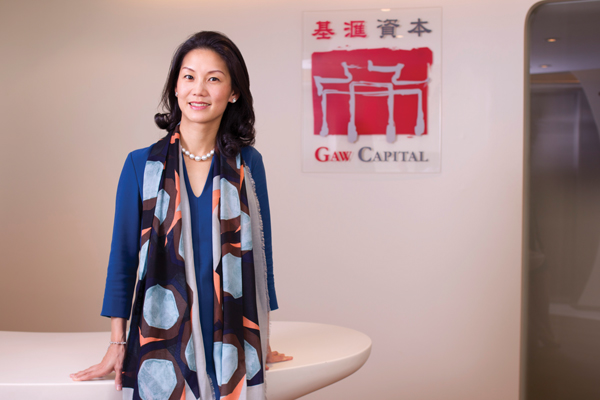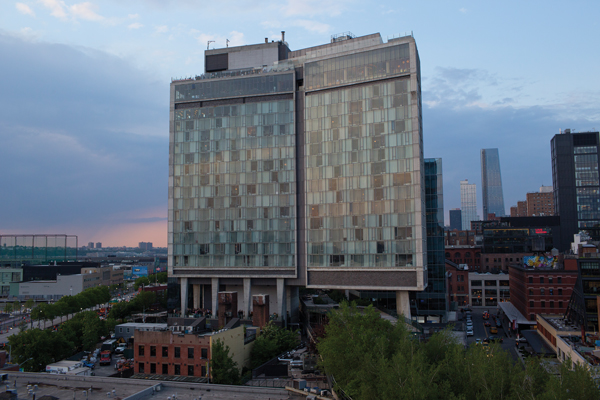If the prevailing wisdom is that a) retail real estate is suffering and b) Chinese investment is on the wane, then Goodwin Gaw’s recent investment is a head-scratcher.
Over the summer, his real-estate-focused private equity firm, Hong Kong-based Gaw Capital, bought the L.A. shopping center Hollywood and Highland for $325 million. That it was the country’s largest single-address retail transaction outside of New York in years only fueled the intrigue.
The property is smack dab in the middle of L.A.’s bustling tourism district and it’s packed with dozens of shops, which haven’t exactly thrived in the face of e-commerce. In fact, lenders say the mall is about 80 percent occupied.
What was even more surprising for some was that Gaw Capital — one of the biggest firms of its kind in Asia, with $23 billion under management and a portfolio that stretches from Vietnam to England — was making a huge bet on American soil at a time when other Chinese real estate companies were pulling back amid a deepening trade war.
The firm’s home city has been convulsed by months-long street protests that have led to injuries and arrests and even shut down the airport. Perhaps Gaw was freshly bullish on overseas markets as some sectors of Hong Kong were struggling.
The reality, as it turns out, is more nuanced.
While Gaw Capital owns a number of other flashy properties around the globe, including New York’s Standard Hotel, in L.A. it’s been a major if unshowy player for decades, with about two dozen holdings.
Indeed, the company’s California-born chair, the 50-year-old scion of a wealthy real estate family, actually did his first deal in Hollywood at the age of 26, when he purchased the run-down Hollywood Roosevelt Hotel and turned it into a see-and-be-seen destination.

He is that rare Asian investor to have a foot firmly planted on both sides of the Pacific, according to brokers who have worked with him.
Prone to a very long-term buy-and-hold strategy, in neighborhoods that others might dismiss as too dicey, the limelight-shunning Gaw tends to downplay current events and market gyrations when investing.
“If you buy right, and you have the right concept for buildings, they turn around pretty quickly,” he told The Real Deal. “And I don’t usually divest unless I can find something more interesting.”
The Hollywood and Highland deal, brokers explain, could fit his general pattern of behavior.
“Goodwin is brilliant in that he can see around the corner before anybody else,” said Hal Bastian, a commercial broker with Amalgamated Metropolitan Properties who was worked Downtown since 1994. Bastian owns a unit in the Douglas Building, a five-story 1898 property Gaw Capital converted into a 50-unit condo in 2005. “He does things first-class.”
California connections
Goodwin’s U.S. roots run deep. Born in San Francisco in 1969, when his parents were studying at the University of California, Berkeley, he later attended boarding school in Lawrenceville, New Jersey before picking up two degrees at the University of Pennsylvania. In 1993, he earned a master’s in construction management at Stanford.
L.A. was next. For a few years, Gaw worked as an asset manager for Kennedy Wilson, a commercial real estate firm, helping Japanese investors divest themselves of U.S. real estate after their buying spree in the ’80s, he said.
In 1995, he made the deal for which he may be best known, the purchase of the Roosevelt, a 12-story hotel on Hollywood Boulevard. Built in 1927, the Spanish Colonial-themed hotel had hosted the first Academy Awards in 1929 but had become run-down by the mid-20th century.

Christina Gaw (Getty Images)
To buy it for $9.5 million from Clarion Hotels, Gaw raised some money himself, he says, though $1 million came from his father, the late Anthony T. Gaw, the billionaire founder of Pioneer Global Group, a Hong Kong real estate conglomerate with telecom holdings. East West Bank, founded in 1973 to serve California’s Chinese-American community, contributed financing.
After a $20 million renovation, the hotel morphed into a celebrity-packed hotspot, attracting the likes of Paris Hilton and Courtney Love to raucous parties that often drew police and ambulances as well.
In 2017, the 335-room property collected $50 million in revenue, according to news reports. That was up from $8 million in 1995. A spokesperson declined to provide more recent data.
Partial to jeans paired with jackets and shirts without ties, Gaw reads more tech bro than real estate mogul when he’s spotted on the property. And while he may have a sixth sense for soon-to-be-hip enclaves, he’s not the kind of executive to end up in gossip pages himself.
In fact, Gaw — a resident of Hong Kong who’s married and has twin boys — says he mostly ends up at taking a room at the Roosevelt when he’s in L.A. to make sure the property is up to snuff.
A deep-pocketed dynasty
Gaw USA, which had $2.3 billion in assets under management as of the second quarter of this year, is currently investing its third U.S. fund. The $719 million fund drew from institutional sources, like college endowments, sovereign wealth funds and pension funds, according to the firm, which is a bit of a family affair. Gaw’s younger brother, Kenneth, is Gaw Capital’s president and generally is considered the number-cruncher.

The Standard Hotel in New York (Getty Images)
His sister, Christina, who formerly worked for Goldman Sachs, is the chief fundraiser, in charge of capital markets. The fourth managing principal is Humbert Pang, who’s based in Shanghai and handles mainland China investments.
The family matriarch, Rosanna Wang Gaw, meanwhile, chairs Pioneer Global Group, the company founded by Anthony, who died at 57 in 1999. Born and raised in Burma before relocating to Hong Kong, Anthony launched Pioneer as a textile manufacturer, though he later branched out into shipping and banking. Anthony was also an early investor in the Industrial and Commercial Bank of China, China’s largest bank, which took itself public in 2006 in a $22 billion offering.
In 2017, the Gaw family was worth $3 billion, Forbes said.
While equity investors generally favor a single national market, they say Goodwin Gaw, who speaks Cantonese, Mandarin and English, straddles both East and West with ease.
“He is considered savvy in both markets by his investors, which is rare,” said Jerry Tang, a managing director of Natixis, which financed the Hollywood and Highland project and provided a $170 million loan for the Standard Hotel purchase, in addition to other deals.
“Goodwin has always been a little bit of a real estate James Bond, a sophisticated quick study who can maneuver in and out of most asset classes in many sought-after markets in varied regions around the world,” said a commercial broker who wished to remain anonymous in order to avoid jeopardizing their dealings with Gaw.
“And he is usually armed with large quantities of ready-to-be-deployed capital,” they added.
As a manager, Gaw likes to delegate. Tang, for one, said he dealt mostly with Gaw’s L.A. office in putting the Hollywood and Highland purchase together. “He’s kind of a low-key guy,” he said. “But he’s connected.”
Historic properties
Interested in reviving down-at-the-heels historic properties, Gaw, after buying the Roosevelt, quickly turned his attention to the Downtown area, along Spring and Main Streets, which was L.A.’s central business district before Bunker Hill’s high-rises sprouted in the 1960s.
In 1996, he bought 818 West Seventh Street, a 12-story brick-and-terracotta 1925 former furniture showroom, along with 611 Wilshire Boulevard, a more modernistic tower, for about $20 million.
No. 818, still an office, its ground level ringed with shops, is today home to Downtown Properties. Founded by Gaw in the mid-1990s, the company manages and leases office, hotel and multifamily buildings in L.A. as well as similar properties in Pasadena and San Francisco.
Gaw was a full-time resident of L.A. until 2003, when he returned to Hong Kong to expand his portfolio. He went on to create Gaw Capital in 2005. Though essentially an offshoot of Downtown, Gaw Capital is now Downtown’s parent company.
A standout in Downtown’s portfolio is the Bradbury Building, a five-story 1893 office building at 304 South Broadway whose skylight-topped, metal-staircase-lined atrium has been a magnet for location scouts for years, serving as a set for movies like “Blade Runner.” Goodwin purchased the building, a National Historic Landmark, for about $6 million in 2003.
Other addresses, though,were converted to condos, like El Dorado at 416 South Spring and the Rowan at 460 South Spring, both in partnership with Tom Gilmore, an L.A. developer.
Gaw’s Downtown moves were well-timed, brokers say. In 1999, the Staples Center opened, giving some suburbanites a reintroduction to the area. The same year, L.A. amended its Downtown zoning to more easily allow apartments to be mixed in with the businesses. It spurred a development mini-boom — even if the area was dicey at night, said Bastian, who moved Downtown in 1994. “We still had people shooting up outside our doors,” he said.
Today Downtown has 80,000 residents, up from 18,000 in 1998, Bastian said.
Gaw’s bet on Downtown was a smart one. It’s also reflective of his philosophy of buying existing buildings as opposed to constructing new ones. “In general, I don’t like to underwrite the development risk,” he added. “A lot of times, the development risk comes from not really understanding localized politics.”
After his return to Hong Kong in 2003, the SARS epidemic hit, sinking Hong Kong property values. But instead of writing the city off, Gaw, unrattled by grim headlines, started snapping up real estate, an approach he also took more recently in a post-Brexit-referendum-vote London.
“I actually wish there was more disruption in the property market. We would have bought more. But I just haven’t seen enough disruption,” Gaw told the website Bisnow last month.
Asian angst
True to form, Gaw seems unfazed by the recent retreat by Chinese investors, spurred by the trade war with the U.S. but also more generally by President Xi Jinping’s continuing clampdown on overseas investing.
Gaw is quick to point out that troubled Chinese companies like Anbang Insurance Group and Greenland Group are located in mainland China and not in Hong Kong, which despite being under control of China since 1997 has operated somewhat autonomously. “The Chinese government has nothing to do with Hong Kong,” he said, adding in a post-interview statement, “we are NOT a traditional Chinese investor.”
“If anything,” Gaw added, “I’m looking for any correction in the market to redeploy capital.”
Still, Hong Kong, where Gaw Capital owns several properties — with partners, it bought 625 King’s Road, a 26-story office tower, for $605 million this year — can seem like not such an ideal place for doing business, either. Since June, the city has been wracked by nearly continuous protests, some of which have turned violent and resulted in building damage. And those protests, which began over concerns about a controversial new Chinese extradition law, have already taken a bite out of the office leasing market, according to news reports.
“People are starting to question the credibility of Hong Kong as an Asian hub,” said Edward Pan, a Colliers vice president working with clients looking to move money to the U.S. and Australia. “Hong Kong will never be the same.”
But Goodwin Gaw is staying put. “This is not the L.A. riots,” he said, referring to the 1992 tumult in the wake of the Rodney King case. “This is a bunch of kids playing war games on the weekend.”
